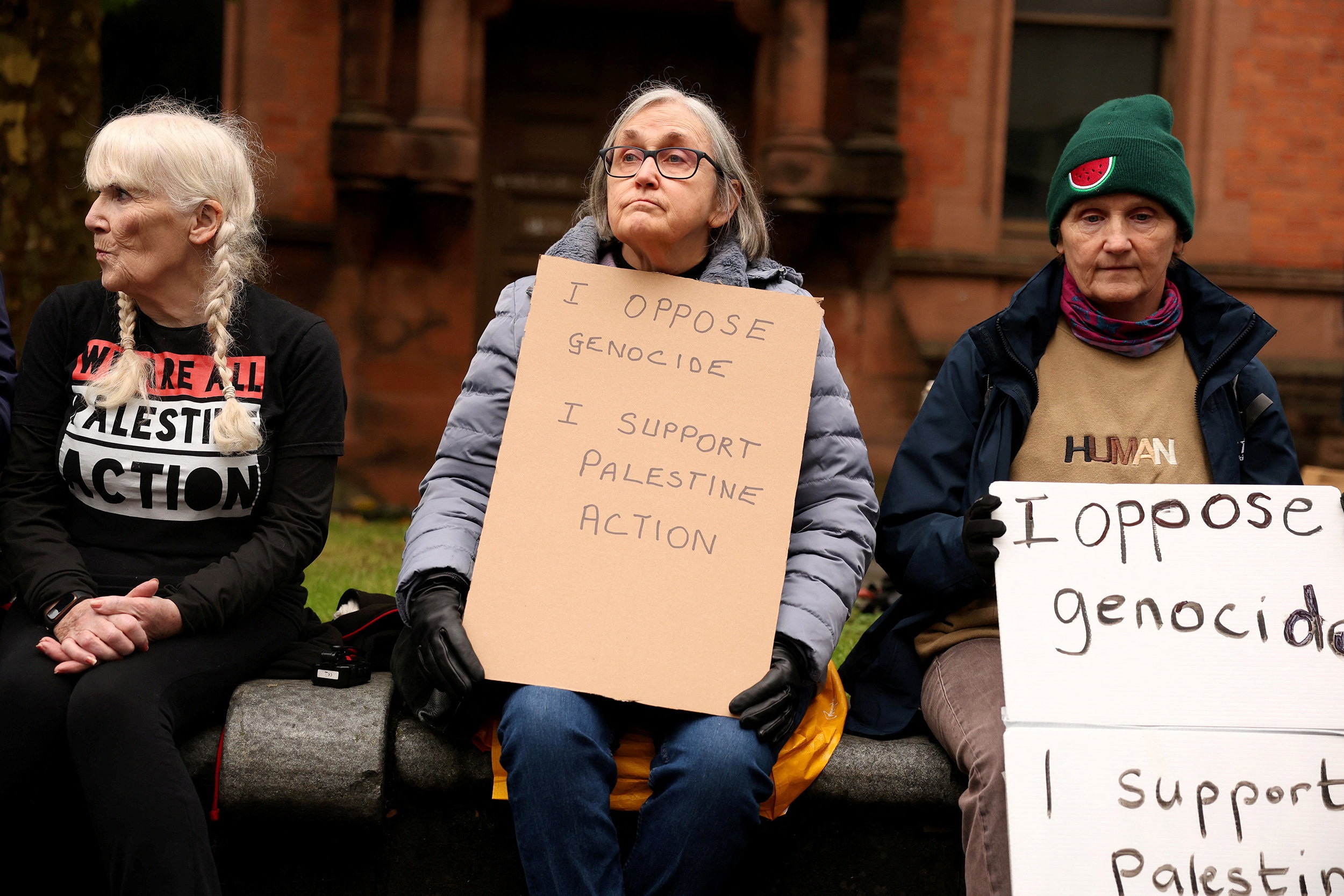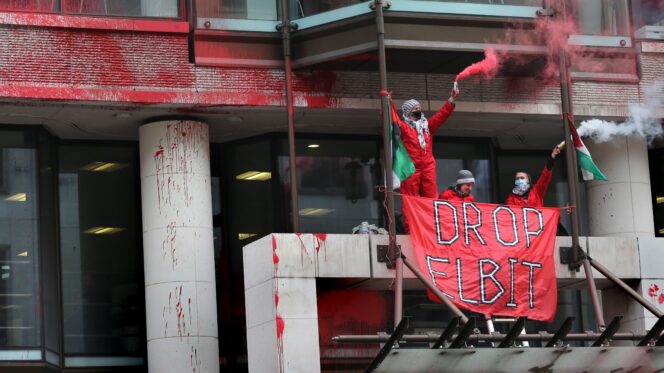Police in Northern Ireland Choose Not to Arrest Palestine Action Supporters
Meanwhile, at least 90 protesters were arrested in London.
by Ellen McVeigh
24 November 2025

Police chose not to arrest any activists in Northern Ireland protesting the proscription of Palestine Action at the weekend, in marked contrast to the policing of similar protests in other parts of the UK.
On Saturday, a group of 12 protesters in Belfast held handmade signs reading “I oppose genocide – I support Palestine Action” outside the Royal Courts of Justice, flanked by more than 50 supporters. Four Police Service of Northern Ireland (PSNI) officers observed the protest from a short distance, but did not intervene. Later that day, activists held signs with the same message outside the Guildhall in Derry. The PSNI made no arrests there either.
The lack of arrests in Northern Ireland comes as dozens were arrested in similar protests across the UK coordinated by Defend Our Juries as part of a two-week campaign organisers have called the most widespread campaign of civil disobedience in modern British history. On the same day as the protests in Belfast and Derry, police arrested at least 90 people holding signs in support of Palestine Action in London’s Tavistock Square.
In a statement, the PSNI said that while no arrests were made at either the Belfast or Derry protest, “an evidence-gathering operation was in place at each protest and [officers] will now review the footage gathered and consider any potential offences”.
The limited police presence on Saturday was representative of the PSNI’s general response to the proscription of Palestine Action in Northern Ireland. Of the approximately 2,300 people who have been arrested for supporting Palestine Action since it was proscribed in July, just three have been in the north of Ireland.
One activist who protested the proscription of Palestine Action in Belfast was Máire Mhic an Fhailí, a 75-year-old grandmother who was part of the civil rights movement in the north of Ireland in her youth.
“I have always fought for a better society. I’ve fought for those rights all my life, and to take those rights away is something that I cannot stand,” she told Novara Media, wearing a T-shirt reading ‘We are all Palestine Action’.
“Our rights are hard won, and hard kept… If we allow the dehumanisation of the Palestinians, it opens the door for all of us. So that’s why I’m here.”
Mhic an Fhailí is one of the few people in northern Ireland to have been arrested for support for Palestine Action at a previous protest on 9 August, for wearing the same T-shirt she was wearing on Saturday. After giving her name and address in Irish and refusing to translate it into English, she was dragged by officers into the back of a police Land Rover.
Patrick Corrigan, the Northern Ireland Director of Amnesty International, attended the Belfast protest on Saturday as a human rights observer.
“We welcome the fact that the police have made a decision today to simply stand back, in small numbers and simply observe the peaceful protest,” he told Novara Media. “That does stand in marked contrast to what we’ve seen in London and elsewhere.”
Palestine Action as a campaign group has had a limited presence across Ireland, with huge support instead for home-grown groups such as the Ireland Palestine Solidarity Campaign (IPSC) or Mothers Against Genocide. But this alone doesn’t explain the disparity in policing in comparison to other parts of the UK.
Most of those across the UK who have been arrested for their support of Palestine Action have been charged under Sections 12 and 13 of the Terrorism Act 2000, which make it an offence to “invite support for a proscribed organisation”, or to wear clothing or display items that indicate support for a proscribed group. In Northern Ireland, however, messages inviting support for proscribed groups can be seen flying from lampposts, painted on gable walls of houses, or carried in funeral processions every day. It’s possible that the PSNI is reluctant to crack down on supporters of Palestine Action with the same vigour as its British counterparts because doing so could prompt questions about the consistency of its policing.
According to a recent report by local outlet The Detail, the PSNI is already facing scrutiny in this regard. Although the PSNI has only arrested three people on terrorism charges related to Palestine Action since July, it has been criticised for taking no similar action against public displays linked to proscribed loyalist or republican groups over the same period.
While the lack of arrests across protests in the north of Ireland this Saturday may highlight the PSNI’s unwillingness to open this can of worms, it has also highlighted the intensity with which this law has been policed in other parts of the UK.
“I think the most notable thing is how the police lack of intervention today contrasts with the policing decisions made elsewhere in the UK this week,” said Corrigan. “It underlines the absurdity of the law, but also that the police have discretion in the policing decisions that they make on the ground.
“If the PSNI can choose to take this discretionary approach, then so could police forces elsewhere.”
Ellen McVeigh is a freelance journalist based in Belfast.


